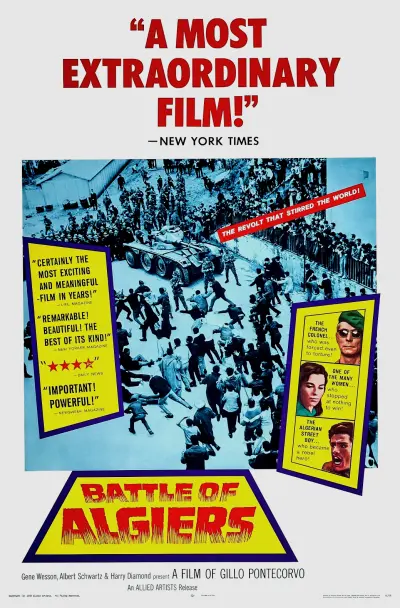
"La Battaglia di Algeri" (The Battle of Algiers), a 1966 Italian-Algerian war film directed by Gillo Pontecorvo, stands as an iconic piece in the realm of political cinema. This seminal film provides a compelling recreation of pivotal events during the Algerian struggle for independence from French colonial domination in the 1950s, focusing specifically on the years 1954 to 1957. This period marks the intense insurgency in Algiers led by the National Liberation Front (FLN) against the French paratroopers.
The film's narrative centers around Ali La Pointe, a figure who undergoes a profound transformation from a petty criminal to a politically radicalized revolutionary. Recruited by FLN commander El-hadi Jafar, Ali becomes a key player in the establishment of revolutionary cells within the Casbah, the densely populated and complex quarter of Algiers. "The Battle of Algiers" meticulously portrays the events in French Algeria, highlighting the escalating partisan warfare between the native Algerians and the Pied-Noir, the European settlers in Algeria.
Renowned for its raw and unvarnished depiction of the tactics utilized by both the FLN insurgents and the French counterinsurgency forces, the film does not shy away from showing the harsh realities of conflict. The FLN's strategies are shown in stark detail, including summary executions and acts of terrorism like the Milk Bar Café bombing, aimed at unsettling the European populace. In turn, the French paratroopers are depicted employing severe methods such as torture, intimidation, and murder in their attempt to quell the FLN uprising and reassert French authority.
"The Battle of Algiers" is particularly acclaimed for its authentic portrayal of urban warfare and its impartial stance on the moral complexities inherent in such a conflict. The film's use of cinéma vérité style, employing black-and-white, newsreel-like footage predominantly with non-professional actors, enhances its historical authenticity. This technique lends the film an element of immediacy and visceral intensity, plunging the viewer into the heart of the unfolding turmoil.
In its concluding scenes, the film presents nationalist demonstrations and riots, suggesting that while France may have emerged victorious in the Battle of Algiers, it ultimately conceded defeat in the Algerian War. The epilogue of the film addresses the eventual triumph of Algeria in securing independence from French rule.
"The Battle of Algiers" is a profound exploration of the intricacies of colonialism, national identity, and the human cost of conflict. Its influence transcends the boundaries of cinema, offering a critical commentary on the nature of urban guerrilla warfare and the cycle of violence that is often intrinsic to colonial and post-colonial struggles. The film's relevance endures, resonating in contemporary discussions about insurgency, counterinsurgency, and national liberation movements, making it a timeless piece in the study of political and social upheavals.

